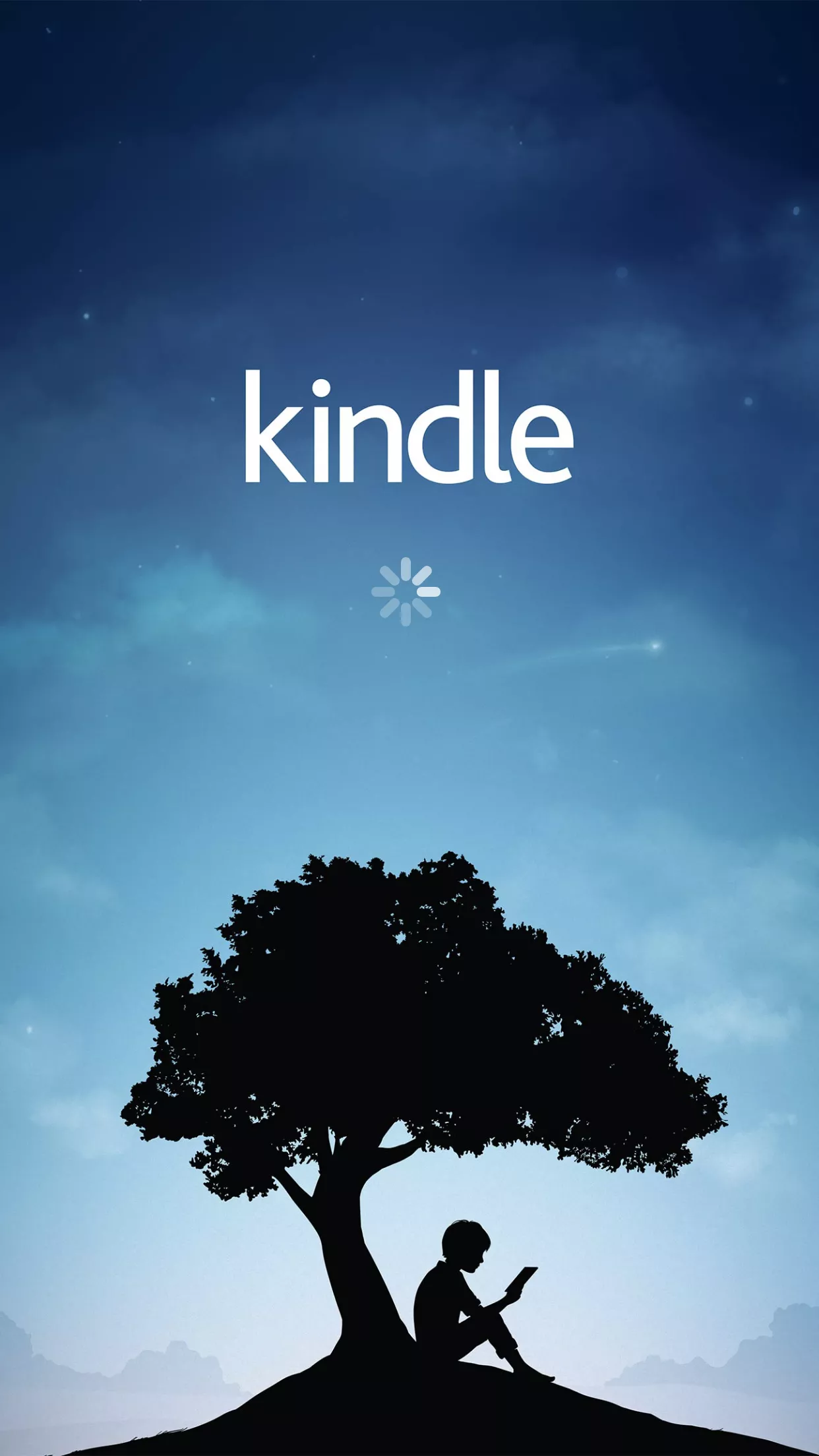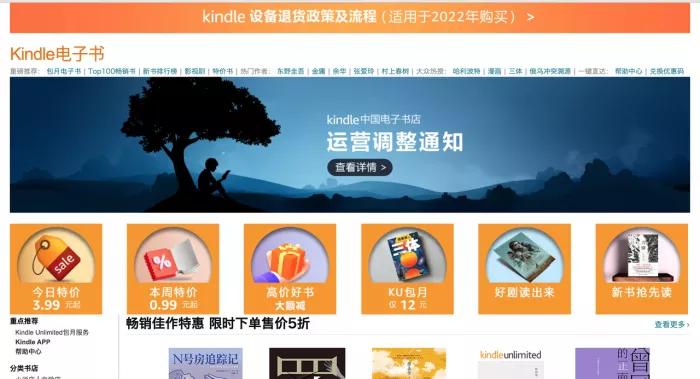When we miss the Kindle, what do we miss? It must not be that I miss a instant noodle cover. Nostalgia is the sight of the past, which must be accompanied by the disappearance and disappearance of certain things. Just as Wang Xinling wakes up the sweet memory, luodayou blows the old night wind. When we sigh with regret that the Kindle has gone, we also miss the pure reading time accompanied by the Kindle.
At noon on June 2, Amazon's Kindle service number issued a notice on the operation adjustment of Kindle China e-bookstore, saying that Amazon will stop the operation of Kindle e-bookstore in China one year later, that is, on June 30, 2023, and users will no longer be able to purchase new books; After June 30, 2024, users will not be able to continue downloading the Kindle app from the app store and continue to use the send to kindle function

Kindle China e-bookstore operation adjustment notice | image source: Amazon official website
As soon as the news came out, social networks such as circle of friends and microblog became a large memorial site for Kindle.
Earlier this year, there was a rumor that the Kindle might withdraw from the Chinese market. At that time, Amazon China's official response was "we are committed to serving Chinese consumers", and refuted the rumor that some models were sold out in the Chinese market because of "lack of core" rather than withdrawal from the Chinese market. At that time, the public thought it was a false alarm.
However, less than half a year later, the Kindle went to the opposite end.
01. "Ignite the flame"
Kindle means to ignite a flame. The name comes from Michael Patrick Cronan, a graphic designer in San Francisco invited by lab 126. He thinks the name implies the excitement brought by books and wisdom.

The Kindle was the passion of Bezos, and it was also an important attempt to explore new business for Amazon, which mainly sold paper books at that time. Bezos regards the Kindle as an improvement of books. He once said that because we cannot surpass the nature of books, we should do things that books cannot do, such as synchronous dictionary lookup, font change and wireless transmission of content. "We must build something better than physical books."
On november19,2007, the First Generation Kindle was born. It sold for $399. Within five and a half hours, the first batch of 25000 kindles were sold out, and they were re launched in April the next year. Before that, e-books had existed for 15 years, but there had never been such a sales event. At that time, the Kindle was backed by the Amazon platform, which had 90000 e-books, priced at only $9.90 per book.
Low pricing has impacted the traditional reading market, and the competition has begun to be digital. Physical retailers are under pressure, while Amazon is becoming more and more competitive.
For the First Generation Kindle, the media dubbed it "the ipod ”It is called. In fact, it was the iPod that gave birth to the Kindle In catch all, billmiller, an investor of Legg Mason, once said that iPod subverted the music business faster than Bezos thought. The development of things caught Bezos a little unprepared. "He always knew that music would eventually be digitized, but he didn't expect that his CD business would be excluded like that."
Bezos therefore decided that Amazon must have its own e-book business, "just like Apple Control music business ". The Kindle meets Bezos' dream of mass merchandising store, promotes Amazon's high-speed operation, and then competes with apple on the same platform. Around 2011, "Kindle has occupied most of the book market, and the potential impact of the device on bookstores is just like what iTunes has done to record stores".
*02. Losing China has long been doomed. The ending of * Kindle in China is lamentable, but this result is not unexpected.
In june2013, Kindle officially entered China. In 2016, China became the largest market for Kindle in the world. By 2018, according to Amazon China, the cumulative sales of Kindle in China had reached millions.

In August, 2017, the co branded gift box produced by Kindle and the palace museum culture took the picture of thousands of miles of rivers and mountains as the protective cover pattern
This achievement is not bad, but for China's huge online reading market with a population of 1.4 billion, millions of kindles are just a drop in the bucket.
The annual scale of China's Publishing Book retail market is nearly 100billion yuan, and the e-commerce channel can account for nearly 80%. Amazon has been eyeing this market for many years. For this reason, it also wholly purchased zhuoyue.com in 2004.
Amazon is invincible overseas, but in the competition between China and jd.com, Dangdang, tmall and other competitors, Amazon has never been able to dominate.
The entry of Kindle into China in 2013 carried Amazon's expectation to open the Chinese book market with hardware Even take the book category as the fulcrum to further leverage China's e-commerce market share and replicate Amazon's successful experience in the global market.
With a more convenient reading experience, the sales performance of Kindle in the first few years before its entry into China was fairly good, especially in the first and second tier cities, which also won a certain market share for Amazon in the Chinese book market.
However, with the richer functions of smart phones, the Kindle experience is no longer prominent, and there are still many problems, such as closed system, low refresh rate and single format A few years later, the rise of the free reading app completely dashed the Kindle's hopes of further expanding its achievements
Based on smartphones with a larger user base, free reading soon occupied the e-book market. According to official data, wechat reading published in 2015 has accumulated 210million registered users and 5million daily lives by the end of 2019, including 2million daily lives of published books.
As long as 19 yuan, you can read a monthly unlimited reading card on wechat. Even for most people, the unlimited reading card and Book Currency redeemed for free by reading time are enough to meet the reading needs, while 19 yuan can only buy oneortwo e-books on the Kindle.
Just like the appearance of Kindle overseas, dimensionality reduction has hit bookstores. The rise of free reading has hit the e-book ecology built by Kindle
To make matters worse, in 2019, Amazon's e-commerce business announced its withdrawal from the Chinese market, leaving only the Kindle e-book business and cross-border e-commerce business in China.
Without the support of Amazon e-commerce, the Kindle is in an increasingly difficult situation. In October last year, the tmall flagship store of the Kindle was closed. At the beginning of this year, in addition to a low-end youth version, all JD self operated flagship stores were out of stock. It was also reported that the Kindle hardware team had been abolished in November last year, retreating step by step, and finally came to the day when the dust settled.

The end result was decent. In order to protect the rights and interests of users, Amazon has kindly launched the "return service for non quality problems" while stopping the supply to dealers from now on. Kindle e-book readers that are purchased through authorized distribution channels in China after January 1, 2022 and are in normal use can be returned by virtue of invoices. The return deadline is October 31, 2022.
When all the functions mentioned in the notice are stopped, I'm afraid the Kindle will really become a brick. I'm afraid it will be too dusty to cover the instant noodle bucket.